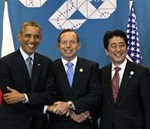The return of geopolitics is all around us. Civil wars in the Middle East and Russian aggression in Ukraine properly dominate the headlines. But more quietly, a potentially more consequential strategic defeat looms for the United States: the Trans-Pacific Partnership (TPP) may fail. Why should we care that some trade pact we have barely heard of collapses into ignominy? Quite simply: the negotiation’s failure would have devastating consequences for U.S. leadership, for the deepening of key partnerships in strategic regions, for the promotion of market reforms in emerging economies, and for the future of the trade agenda. Consider the following:
The United States would lose the ability to make the rules in international trade. The World Trade Organization (WTO) has been unable to update the multilateral rules on trade and investment for the past 20 years. In the meantime, global supply chains have profoundly altered patterns of international production and trade. Deep free trade agreements (FTAs) like TPP seek to provide new rules that match the realities of 21st century trade. They focus on the liberalization of services that are critical to the efficient management of dispersed production chains (telecommunications, transportation, etc.), the protection of foreign investments and intellectual property rights, and avoiding predatory market behavior of state-owned enterprises. With the stagnation of the WTO, we have moved to a system of decentralized competition where different clusters of countries seek to define the standards for economic integration. As President Obama has warned, if we don’t write the rules on trade, China will. Moreover, we will have no way to encourage China to move away from its mercantilistic practices.
The rebalance to Asia will stall. TPP is the second leg (after a reorientation of military resources) of the policy of rebalancing to Asia. As such, its fate will determine whether this strategy advances or just limps along. If TPP fails, doubts about the staying power of the United States will once again rear their ugly head. The signature U.S. policy to remain vitally connected to the world’s most dynamic economic region will come to naught. Let’s not forget that prior to the advent of TPP, the United States appeared poised to be marginalized from the process of regionalism in Asia.
The U.S.-Japan alliance will lose a critical pillar. Trade has in the past been a divisive issue for the two allies. If TPP fails, it will demonstrate that the United States and Japan cannot move past frictions over market access in agriculture and automobiles to work in areas such as internationalization of financial services, protection of intellectual property, and governance of the internet economy that are central to the 21st century economy.
The international trade agenda will hit a dead end. If TPP fails, the most significant trade agenda in a generation will come to a grinding halt. At that point, how can the trade agenda move forward? The WTO is not institutionally fit to advance a deep integration agenda. If a group of 12 countries that have self-selected are unable to wrap up an agreement, what other alternatives are there? The collapse of the TPP talks will greatly undermine the chances of success of the transatlantic trade negotiations and the East Asian trade deals are unlikely to generate deep integration commitments.


Comments are closed.